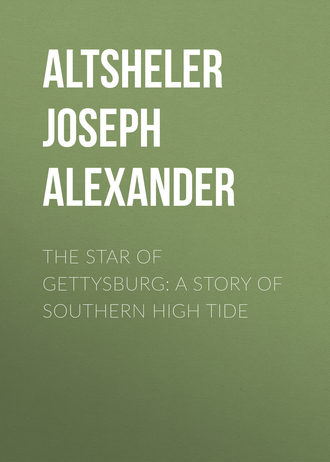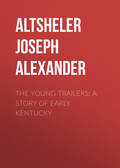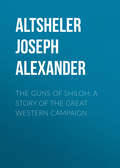
Altsheler Joseph Alexander
The Star of Gettysburg: A Story of Southern High Tide
Dalton stood by Harry's side, and the darkness was so intense that he seemed but a shadow. A little further away was Jackson. No fires had been lighted in his camp, but nevertheless he was not a shadow. That personality, quiet and modest, was so intense, so powerful that it seemed to Harry to become luminous, to radiate light in the blackness of the night. It was imagination, he knew, at work again, but it was Jackson who had loosed its springs.
"Can you see your watch, George?" he whispered to Dalton.
"Yes, and its says only twenty minutes past three in the morning."
"And our signal guns began about twenty minutes ago. They will have nearly four hours in which to work before the sun rises and we can see them well enough to take good aim."
"And maybe longer than that, Harry. The whole night is permeated with the heaviest inland fog I ever knew. Maybe it will take the sun a long time to strike through it or drive it away. It's bad for us."
"But we'll win anyhow. I tell you, we'll win anyhow! Do you hear me, George?"
"Yes, Harry, I hear you. You're excited. So am I. There are mighty few who wouldn't be at such a time; but look at the general! He stands like a statue!"
General Jackson did not move, save to lift his glasses now and then, as if with their magnifying powers he could pierce the dark. But the night and the swollen fog still hid everything going on beyond the river from those on the heights. Down by the shore the Mississippians in their rifle pits might see a little, and the scouts undoubtedly had seen much, else the signal guns would not be firing.
Harry's pulses, after a while, began to beat more smoothly and there was not such a painful and insistent drumming in his head. Emotions yielded now to will and he waited patiently. General Jackson for the first time told some of his young officers that they could lie down and rest.
"There can be no action before daylight," he said, "and it's best to be fresh and ready."
He spoke to them with the grave kindness that he always used, save when some great fault was committed, and then his words burned like fire. Harry and Dalton procured their blankets from their tents, wrapped them about their bodies and lay down on the dryest spots they could find, but they had no thought of sleep. They permitted their limbs to relax, and that was a help to the nerves, but neither closed his eyes.
Those dark hours seemed an eternity to Harry. The floating fog seemed to grow thicker and to enter his very bones. He shivered and drew the blanket close. Now, with his ears close to the earth, he was sure that he could hear the axes and the saws and the hammers beating on steel rivets on the other side of the Rappahannock.
The Confederate cannon still fired the signals of alarm at regular intervals, but the night and the fog always closed in again quickly over the flash that the discharge had made. After a while a murmur came from the long Southern line along the heights and on the ridges. Horses stirred here and there, cannon, moved to new positions, made sighing sounds as their wheels sank in the mud; sabres and bayonets clanked, thousands of men whispered to one another. All these varying sounds united into one great soft voice which was like the murmur of a wind through the summer night.
Toward five o'clock in the morning, when the darkness had not diminished a whit, a messenger from General Lee rode up with a note for General Jackson. It merely stated that all was ready and to hold the positions that he had taken up the night before. Jackson wrote a brief reply by the light of a lantern that an orderly held, and the messenger galloped away with it. It was the only incident that had occurred in a long time.
"They're not using many lights on the other side of the river," said Harry, although he noted an occasional flame in the darkness. "Of course, they want to hide their bridge building, but you'd think they'd have fires burning elsewhere."
"They've learned the value of caution," said Dalton. "I'm bound to say they're going about the first part of their work with skill."
He spoke with the calm superiority of a young Officer.
Harry took out his own watch, and by holding it close to his eyes was able to read its face.
"A quarter to six," he said. "According to the watch it is less than three hours since we first heard those alarm guns, but my five known senses and all the unknown tell me that it has been at least a week."
"In an hour we should see something," said Dalton. "Confound this fog. If it weren't so thick we could see now."
Harry's pulses began to beat hard again in the next hour. He strove with glasses even for a glimpse of the winter sun which he knew would come so late, but as yet the fog showed nothing save a faint luminous tinge low down in the east. An orderly brought food to them, and while they ate they saw the luminous tinge broaden and deepen.
"The sun's rising behind that fog," said Dalton, "but here comes a little wind that will drive away the fog or thin it out so we can see."
"Yes, I feel it," said Harry, "and you can see the dull, somber red of the sun trying to break through. Look, George, unless I'm mistaken the fog's moving down the river!"
"So it is, there's the flash of the stream, the color of steel, and by all the stars, there's their bridge two-thirds of the way across!"
Heavier puffs of wind came and the fog billowed off down the river. The whole gigantic theater of action sprang at once into the light. There were the two great armies clustered on opposing ridges, there was the deserted town, there was the deep river, the color of lead, flowing between the foes, two-thirds of its width already spanned by the Union bridge, the bridge itself covered with workmen, and boats swarming by its side.
Harry felt a thrill and a shudder which were almost simultaneous. Then came a deep muffled roar from the two armies on the ridges looking at each other. But as the roar died it was succeeded by the rapid, stinging fire of rifles. The Mississippians in their pits and cellars near the bank of the river were sending a hail of bullets upon the bridge builders.
The rest of the Southern army stood by and watched. Harry knew that Lee and Jackson would make their chief defense on the ridges, but the Mississippians were there to keep the enemy from being too forward. So deadly were their rifles that every workman fled off the bridge to the Union shore, save those who were struck down upon it, falling into the water.
Then came a pause, a period of intense waiting, short, but seemingly long, even to the veteran generals, after which the gallant builders, who truly deserved the name of the bravest of the brave, ventured again upon the bridge in the face of those terrible Mississippi rifles. A blast of death again blew upon them. Bullets in hundreds struck upon bodies or rattled on timbers. The workmen could not live in the face of such a fire, and those who had not been slain retreated again to their own side of the stream. A third time the heroic bridge builders returned to their work, and a third time they were driven back by the deadly Mississippi hail. Harry felt pity for them.
"I never saw anything braver," he said to Dalton.
"Nor did I, Harry, nor anything more useless. The bridge builders never had a chance before the rifles. But now their supports, which should have been there all the time, are coming up."
Heavy columns of Union riflemen moved forward to the edge of the river and replied to the Mississippians. But the Southerners, in the shelter of the cellars and pits, held their ground. But few of them were hit and they kept up that deadly hail which swept the uncompleted bridge clear of every workman who attempted to go upon it.
The rapid fire of the rifles crashed up and down both sides of the river, two sheets of flame seeming to reach out as if they would meet each other. The wind that had driven away the fog also carried off the smoke, and the river still gleamed like steel between. Then, as the rifle fire died again, there was another silence for a while.
"It will take more than rifles," said Harry, "to drive out those intrenched Mississippians."
"So it will, Harry," said Dalton, who was watching through glasses, "and here it comes. Their great batteries are about to open."
The next instant the whole earth seemed to be shaken by the roar of heavy cannon. The opposing hills and ridges fairly poured forth flame, and shells and solid shot crashed upon the whole devoted town. Nor did this tremendous fire from a hundred and fifty great guns cease for an instant. The roar and crash were appalling. Harry saw houses crumbling in Fredericksburg, with flames leaping up from others.
The artillery of Longstreet immediately facing the Union batteries was too light and weak to reply, and the gunners remained quiet in their trenches while the storm rained its showers of steel upon the town. Yet the Mississippians in the rifle pits held fast, their earthen shelters protecting them. While the bombardment was at its very height workmen ran out on the bridge for the fourth time to complete it, and while the shells and solid shot were whistling over their heads, the rifles of the Mississippians once more swept it clean. Harry groaned. He could not help it at the sight of men so brave who were cut down like grass by the scythe. Then his attention turned away from the bridge to the mighty cannonade which seemed to be growing in volume. The wind took much of the smoke across the river and it floated in a great cloud over Fredericksburg, through which shot the flames of the burning buildings.
But the main army of the South, stretched along a front of six miles, remained silent. Jackson on the right scarcely moved, but all the while he attentively watched through his glasses the great cannonade. Nearly all the soldiers were lying down, and to most of them the earth seemed to heave with the shock of all those blazing cannon.
Harry and Dalton walked once to the point where the Invincibles lay. That is, all but Colonel Leonidas Talbot and Lieutenant-Colonel St. Hilaire were lying down. They stood rigidly erect, their eyes on the great cannonade, and as Harry approached they were exchanging brief comments with each other.
"What harm does that cannonade do, Hector?" asked Colonel Talbot.
"Much to the town, little to us."
"What a pity we don't have an artillery equal to theirs."
"A great pity, Leonidas."
"They will presently move forward in much greater force to finish the bridge."
"Undoubtedly, Leonidas. They have shown folly, wasting the lives of such brave men in small efforts one after another. They will try something else."
"I see a great many boats against the bank on their side of the river. I fancy they will use them in their next attempt, whatever it may be."
"I agree with you. Good morning, Lieutenant Kenton. A mighty and appalling sight."
"Truly it is, sir," said Harry, saluting the two officers.
"The Yankees will force the passage," said Colonel Talbot. "Our artillery is not strong enough to reply to their covering cannonade. We are glad to see you safe and whole, Harry. You'll find your friends lying in that ravine just behind us."
It was a rather deep ravine, and when Harry looked over its edge, St. Clair and Langdon greeted him gladly.
"Come down, Harry," said Langdon, "and be joyful. This gully is pretty well dried out and you can rest. We've got a West Point fellow here and he's humming one of his old songs to about the biggest chorus a song ever had. Captain Swayne, Lieutenant Kenton, once of the Invincibles, but now of General Jackson's personal staff. Swayne's from Tennessee, Harry, and you two are well met. Swayne belongs to a regiment a few yards beyond the gully. He was at the Seven Days and the Second Manassas. We three thought we won those battles ourselves, but it seems that Swayne was at both all the time, helping us. Take off your cap, Harry, and thank the gentleman."
Swayne, a slender, fair man, not over twenty-three, smiled and extended a hearty hand, which Harry received with equal heartiness. The smile turned into a slight twinkle.
"I've been glad to meet your friends here, Mr. Kenton," he said, "but the meeting has brought a disappointment with it."
"How's that?"
"Until we began talking I thought I had won the Seven Days and the Second Manassas all by myself. Now, it seems that I have to share the honors with you fellows."
"So you do," said Langdon, and then he sang:
"There comes a voice from Florida,
From Tampa's lonely shore,
It speaks of one we've lost,
O'Brien is no more.
In the land of sun and flowers,
His head lies pillowed low,
No more he'll drink the gin cocktail,
At Benjamin Haven's, Oh!
At Benny Haven's, Oh!
At Benny Haven's, Oh!"
"Do I get it right, Swayne? Remember that I heard you sing it only three times."
"Fine! Fine!" said Swayne with enthusiasm. "You have it right, or as near right as need be, and you're using it in a much better voice than I can."
"I'm a great soldier, but my true place is on the operatic stage," said Langdon modestly.
"It's an old West Point song of ours, Kenton," said Swayne. "While I was lying here listening to the continued roar of all those great guns, I couldn't keep from humming it as a sort of undernote."
"This gully has a queer effect," said St. Clair, who, lying on a blanket, was dusting every minute particle of dried mud from his uniform. "It seems to soften the sounds of all those guns—and they must be a couple of hundred at least. It produces a kind of harmony."
"It's the old god Vulcan and a thousand assistants of his hammering away on their anvils," said Harry, "and they hammer out a regular tune."
"Besides hammering out a tune," said St. Clair, "they're also hammering out swords and bayonets to be used against us."
As he spoke he drew from his pocket a tiny round mirror, not more than three inches in diameter, and carefully examined the collar of his coat.
"Have you found a speck, Arthur?" asked Langdon. "If I hadn't seen you risk your life fifteen or twenty thousand times I'd say you're a dandy."
"I am a dandy," said St. Clair. "At least, I mean to be one, if I come out of the war alive."
"What do you intend to wear?" asked Harry.
"Depends upon what I can afford. If I have the money, it's going to be the best, the very best any market can afford."
"A dozen suits, I suppose."
"At least as many, with hats, shoes, overcoats, cloaks, shirts and all the et ceteras to match. Why shouldn't I wear fine clothes if I want 'em? Do you demand that instead I spend it on fiery whisky to pour down me, as so many public men and leading citizens do? The clothes at least don't burn me out and finally burn me to death."
Langdon put up his hands in defense.
"I haven't jumped on you, Arthur," he said. "I admire you, though I can't equal you. And as I'm not willing to be second even to you, I'm going to our sea island, near the Carolina coast, when this war is over, lie down under the shade of a live oak, have our big colored man, Sam, to bring me luxurious food about once every three hours, and between these three-hour periods I'll be fanned by Julius, another big colored man of ours, and I won't make any exertion except to tell day by day to admiring visitors how I whipped the Yankees every time I could get near enough to see 'em, and how a lot more were scared to death just because they heard me crashing through the brush."
"You'll do the bragging part, all right, Happy," said St. Clair. "I believe you could keep up the sort of existence you describe for a year at least."
"I'd like to try. Now, what under the stars is that?"
Nothing had happened. Something had merely ceased to happen. The great cannonade had stopped in an instant, as if by a preconcerted signal, and their nerves, attuned so long to such a continuous roar, seemed to collapse, because some support was withdrawn. Harry's face turned white and his heart beat very fast, but in a few moments he recovered himself.
"I suppose they've given it up for the time being," he said, "but they're sure to try it again in some other way."
"That's a safe prediction," said St. Clair. "Burnside is trying to get across the Rappahannock to attack us, because the whole North is driving him on, and he hasn't got the moral courage to hold back until he can choose his time and place. Funny how this silence oppresses one."
The whole Southern army, along its six miles of length, was now standing up and looking toward the point on the other shore of the Rappahannock where the Union batteries were massed. All work seemed to have been abandoned there, although the troops were still clustered along the shore and about the bridge head. Clouds of smoke from the great batteries floated down the river.
"A Yankee failure so far, Harry," said Colonel Leonidas Talbot. "The bridge has advanced no further, and I should say that our shore is now enriched by about fifty thousand pounds of steel hurled from those batteries and with little harm to us."
"I've no doubt you're right, sir," said Harry, "and now that a period of rest has come, I shall hurry back to General Jackson, who may need me to carry some order."
"A moment, please, Harry, my boy," said Colonel Talbot, twirling his mustaches. "You are near to General Jackson, of course, being his personal aide. If it should fall out conveniently, would you do myself and my most excellent friend and second, Lieutenant-Colonel St. Hilaire, a small favor?"
"Of course, Colonel. Gladly. What is it?"
"If the enemy should cross the river, as he probably will, and if you should be near enough to Lieutenant-General Thomas Jonathan Jackson, and if the moment should be propitious, would you kindly whisper in his ear that the skeleton regiment, known as the Invincibles, Leonidas Talbot, Colonel, and Hector St. Hilaire, Lieutenant-Colonel, would be overjoyed at the honor of leading the attack upon the intrusive and invading Yankee army?"
"Promise, Harry, promise!" seconded Lieutenant-Colonel Hector St. Hilaire in his softest and most persuasive South Carolina accent. "You really owe that to us."
"I promise gladly," replied Harry; "but you know what General Jackson is. He makes his plans without telling anybody what they are, and he carries them out. If it is a part of his plan for the Invincibles to lead the attack, so far as his division is concerned, you'll lead it. If not, you won't."
"But still a word in his ear might have some influence," persisted Colonel Talbot. "It might come at the very moment when he was hesitating over a choice, and it would probably decide him in our favor."
"Then I shall do my best, sir," said Harry. "You can rely upon me"
He returned to General Jackson, but found that his commander was yet inactive. He was still waiting and watching with a patience that seemed equal to that of the Sphinx. Noon came, food was served, and the hours trailed their slow length on.
Then they saw a great movement in the Union army. The Northern generals were about to make their supreme effort. Hooker, who had shown such desperate courage at Antietam and who had won the name of Fighting Joe, called for men who would cross the river in boats under the fire of the Mississippi rifles. It looked like certain death, but four entire regiments came forward at once. They entered the boats, which promptly pulled for the right bank, and the great batteries at once opened a covering fire.
The Mississippians once more sent forth their hail of bullets, but the boats were so numerous that, although some were stopped, the majority came on. Man after man, shot through, fell over the sides into the deep river. Sometimes a boat itself sank, but the main force rapidly approached the Southern side.
"They have lost many men, but they will make the crossing at last, Harry," said Dalton.
"So it seems," said Harry. "I suppose our generals could bring up enough men to drive them back, but it looks as if they don't want to do it."
"It may be that they're holding the trap open for the victim to walk in."
"However it may be, they're across. See, they're landing in thousands, and the Mississippians, leaving their rifle pits, are retreating. Now they can finish the bridge and as many more as they need at their leisure."
The retreating Mississippians rejoined their comrades, and still the Southern army did not stir. The Northern army, almost unmolested, continued its bridge building, and the afternoon and a dark night passed.







